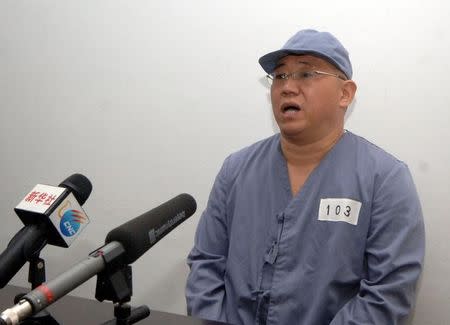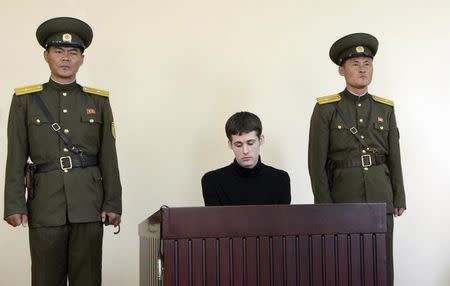Two Americans freed by North Korea, returning home - U.S. officials
By Bill Trott WASHINGTON (Reuters) - U.S. citizens Kenneth Bae and Matthew Todd Miller have been freed from detention by the North Korean government and are returning to the United States, the U.S. government said on Saturday. Bae and Miller were being accompanied home by James Clapper, the director of national intelligence, his office said. Their release comes less than three weeks after another American was freed by Pyongyang. Bae, a missionary from Washington state, was arrested in North Korea in November 2012 and sentenced to 15 years of hard labor for crimes against the state. Miller, who reportedly was tried on an espionage charge, had been in custody since April this year and sentenced to six years of hard labor. The United States had frequently called for their release for humanitarian reasons, especially since Bae was said to have health problems. Clapper's role in the release was unexpected and the U.S. government gave no other details yet of how it came about. The move came just hours before President Barack Obama left for a trip to Asia that is to include talks with Chinese leaders about how Beijing can use its influence with North Korea to rein in its nuclear program, U.S. officials have said. Bae's son Jonathan told Reuters from Arizona that he received a call Friday night and was able to speak to his father. "I'm very thankful. It's awesome," Jonathan said. "I couldn't be happier. Finally it's over and he's coming home. "The brief time on the phone, he sounded good. "I'm sure he will be back to his old self in no time." The U.S. State Department issued a statement thanking Sweden for its part in the release of Bae and Miller. Sweden serves as a diplomatic intermediary for the United States in North Korea because Washington has no diplomatic ties with Pyongyang. "We are grateful to Director of National Intelligence Clapper, who engaged on behalf of the United States in discussions with DPRK authorities about the release of two citizens," the State Department statement said. North Korea has been on a diplomatic campaign to counter charges by a U.N. body that highlighted widespread human rights abuses and a move by some U.N. members to refer the state to an international tribunal. "North Korean policy continues to zig-zag," said Stephan Haggard, a North Korea expert at the University of California in San Diego. "After pursuing a charm offensive aimed at restarting North-South talks and even a human rights dialogue, North Korea shut those initiatives down following the tabling of a strongly worded human rights resolution at the U.N. General Assembly. But the release of Miller and Bae suggests an effort to keep channels for dialogue open." In late October North Korea freed Jeffrey Fowle, 56, a street repair worker from Miamisburg, Ohio, who had been arrested in May for leaving a Bible in a sailor's club in the North Korean city of Chongjin, where he was traveling as a tourist. In September, Pyongyang allowed Bae, Miller and Fowle to be interviewed by CNN and the Associated Press. The men said they were being treated humanely and appealed to the U.S. government to push for their release. The interview was seen as a sign that North Korea was looking for a way to open dialogue with Washington. Miller, of Bakersfield, California, and said to be in his mid-20s, had gone to North Korea on a tourist visa, which state media said he tore up while demanding Pyongyang grant him asylum. He was traveling without foreign guides, according to Uri Tours, the company that organized the trip. The Associated Press reported Miller was tried on espionage charge and prosecutors at his trial said he had falsely claimed to have secret information about the U.S. military stationed in South Korea. On Monday Bae's family had marked the second anniversary of his detention by releasing a statement asking for renewed efforts by the United States and for mercy from North Korea. The family said on its website that Bae had been operating out of China since 2006 and had led more than a dozen tours of North Korea. They said his health problems included diabetes, an enlarged heart, deteriorating vision and back and leg pains. Despite North Korea's poor record on human rights and stand against religion, tourism to the isolated country has increased markedly in the past few years, with some tour operators estimating a tenfold increase in Western visitors in the past decade. (Writing by Bill Trott; Additional reporting by Brendan O'Brien in Milwaukee and James Pearson in Seoul; Editing by Frances Kerry)



